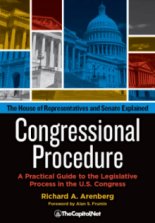Pair / Logrolling (CongressionalGlossary.com)
From the Congressional Glossary – Including Legislative and Budget Terms Pair / Logrolling photo credit: dno1967b A pair is a voluntary, informal arrangement that two lawmakers, usually on opposite sides of an issue, make on recorded votes. In many cases the result is to subtract a vote from each side, with no effect on the … Read more


